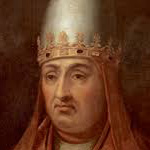
Pope Boniface VIII was the 193rd pope and one of the most controversial from history. He reigned for more than eight years and was responsible for Unam Sanctum. This article will go over his life and some of those controversies.
Early Life
Given the name Benedetto at birth, the man who would become Pope Boniface VIII belonged to the Caetini family. His uncle was a high ranking official in Italy. He also had a grand-uncle who served as pope, Pope Alexander IV. While working with his uncle, Benedetto joined the Order of Friars Minor and spent time in their monastery. Pope Martin IV consecrated him as a cardinal in 1281.
Papal Election
Pope Celestine V was one of the only popes to abdicate the throne. Some of the records from this time state that Benedetto was one of a small group who asked the pope to resign. Ten days after he resigned, 22 cardinals met in Rome to name the next pope and chose Benedetto who immediately selected the name Boniface V.
Unam Sanctum
One of the more controversial acts that Pope Boniface VIII performed was the issuance of Unam Sanctum. Released in November of 1302, it was a response from the pope during his long-standing battle with the King of France. It essentially declared that the pope acted on the authority of God and that the pope was the supreme ruler. He believed that everyone should bow to him.
Death and Other Controversies
Pope Boniface VIII was also known for his excommunication of the King of France and for taking control over land owned by an Italian family. He took the land by force and then gave it to his loved ones. After he excommunicated other French men, the King sent men to Rome to abduct him.
They held him for three days and severely beat him, which likely contributed to his death a few weeks later. After professing his faith and taking the sacraments, he passed away surrounded by some of his closest allies. They later reported that he was strong in the days leading to his death.
Quick Facts About Pope Boniface VIII
- He was born circa 1230 in Anagi, which was both part of the Papal States and the Holy Roman Empire.
- His birth name was Benedetto Caetani.
- Pope Boniface VIII died on October 11, 1303.
- His death occurred due to an illness that caused him to have a high fever. Eight cardinals and some of his regular staff were beside him.
- His papacy began on December 24, 1294.
- The papacy of Pope Boniface VIII ended when he died.
- Benedict XI was the successor to the papal throne.
Interesting Facts About Pope Boniface VIII
- In Inferno, Dante typically used the names of people who were dead. He included Pope Boniface VIII and placed him Hell for some of the actions he performed on earth.
- Pope Clement V allowed King Philip IV to conduct a posthumous trial of Pope Boniface VIII. Three cardinals who attend the trial claimed that he was a pious man. Several knights also spoke on his behalf, which led to the trial ending without bringing any charges against the former pope.
- The television series Knightfall portrays Pope Boniface VIII as a main character played by Jim Carter. His depiction on the show is quite different from his real persona.
- For the Great Jubilee of 1300, the pope orders workers to repair and restore several churches in Rome. This included some of the last work done on the Old St. Peter’s Basilica before it was later torn down.
- Despite the controversies that surrounded him, Boniface VIII was pope for eight years and 291 days.
A list of all the popes named “Boniface”
Boniface I (St.) (#42) (418 – 422)
Boniface II (#55) (530 – 532)
Boniface III (#66) (607)
Boniface IV (St.) (#67) (608 – 615)
Boniface V (#69) (619 – 625)
Boniface VI (#113) (896)
Boniface VIII (#194) (1294 – 1303)
Boniface IX (#204) (1389 – 1404)